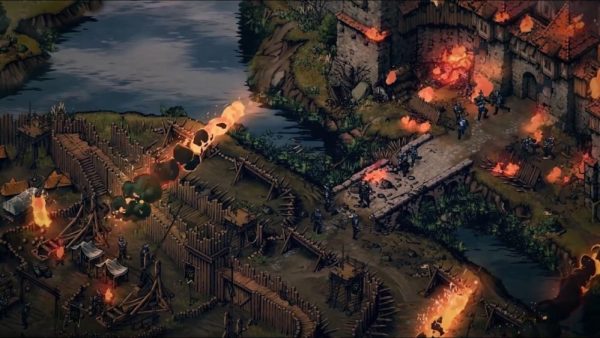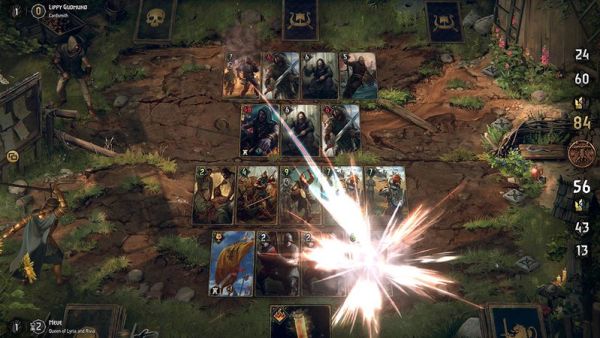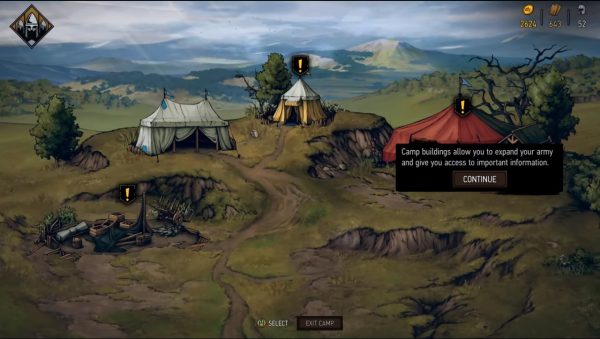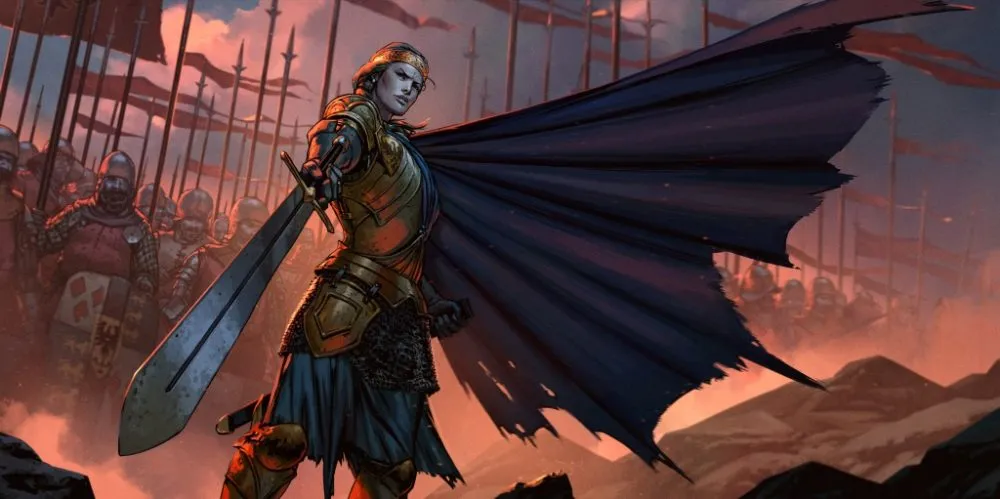Thronebreaker: The Witcher Tales for PC
The digital card game genre has been steadily growing for years following Blizzard’s hugely popular title Hearthstone. With big names like Magic the Gathering and Valve’s Artifact soon to join the fray, it’s becoming a hugely competitive space.
Yet there’s nothing else quite like Thronebreaker: The Witcher Tales, a sprawling 30 hour standalone RPG experience that combines CD Projekt Red’s awesome Gwent card game from The Witcher 3: Wild Hunt with the studios’ talent for storytelling.
It’s the first attempt I can think of that implements a collectible card game into a story-driven experience, which makes it very exciting. Particularly so, given the pedigree of the developer at its helm and their well-earned reputation for almost excessive amounts of content and attention to detail.
Thronebreaker does not disappoint in this regard, you’ll be pleased to hear.
Indeed, while it does occasionally feel like it was designed principally to acclimate Gwent newcomers and get them onboard for its multiplayer portion, Thronebreaker is by no means a half-cocked effort. This is a meaty, full-blooded RPG that feels like a self-contained experience with plenty on offer to enjoy all on its own. Most importantly, its superb production quality and exceptional writing make it feel every bit as relevant as the mainline Witcher trilogy.
Thronebreaker follows the story of Queen Meve of Lyria, whose country –along with the entire region– has been invaded by the Nilfgaardian Empire, an aggressor that will be familiar to anybody that knows Witcher lore. Meve soon discovers a deception that forces her into exile, which tees up a journey across the continent to rally support for a brave fightback.
Meve herself is a very compelling protagonist, a brave and fierce female lead who commands the respect of an also brilliant cast of supporting characters. The quality of writing across the board is exceptional –typical of what we’ve come to expect from CD Projekt Red– and the lines are delivered exceptionally well by the voice actors. Overall, the standard is easily on a par with anything in The Witcher 3.

The art-style and gameplay are obviously completely different from The Witcher trilogy, though.
Thronebreaker plays from an isometric perspective and uses a cel-shaded, stylized aesthetic. It gives the game a vibrant, fantasy vibe –especially in combination with the cutscenes, which play out something akin to a visual novel. There’s also a narrator’s voice that frequently chimes-in, both to direct the main thrust of the tale and dramatize less significant scenes that take place across the game’s various maps.
Overall, I absolutely loved the tone and ambiance created by the Thronebreaker’s visual design. In combination with a captivating score, it feels like a pleasing bridge between The Witcher video game trilogy and the novels written by Andrzej Sapkowski.
But let’s talk about Gwent, because that’s the all-important digital card game element to Thronebreaker that makes it so unique.
Gwent combat is divided into two different sorts of battles: standard three-round or shortened Gwent battles; and puzzles, shortened versions with special rules that require you achieve certain objectives with a custom deck –most of which are optional encounters denoted with a special symbol above an enemy’s head.
Thronebreaker uses the same revamped version of Gwent that has recently been introduced to the multiplayer game for its final full version, titled Homecoming. It isn’t the same simple battle of attrition as The Witcher 3 mini-game. The principal difference is that there are only two rows in battle –melee and ranged– and all cards can be both attacked and destroyed as well as fortified with armor for extra defense.
Typically, that involves using card abilities, of which most unit cards now boast, but there are also Trinket and Trophy cards that give players a range of different abilities to build tactics around. The Bear card, for example, that turns damaged ally cards into mighty bears, and Lyrian Merlot, which boosts the power of your lowest ally card by the highest.
Leader cards are still a thing, but they’re much more involved than before, with their own abilities that can be used multiple times in each battle. As the game wears on, there are different “weapons” to equip your leader with (essentially, just different cards) that produce different buffs and effects when used.
All of these extra layers turn Thronebreaker’s Gwent into something that feels closer to conventional turn-based combat than the card game from The Witcher 3. But given how limited that version of the game was, this certainly isn’t a bad thing. For avid players of Gwent’s standalone spin-off, they’ll also appreciate the new balancing of the tweaks introduced by Homecoming.

Ultimately, the new layers added to Gwent allow you to approach combat in different playstyles, and Thronebreaker certainly requires players to adjust their deck to overcome different challenges throughout the game. This is all managed through a “Pitch Camp” option, a base where you can modify your deck and craft new cards.
You’ll also have the option to improve Meve’s attributes, allowing her to carry a more varied and powerful retinue of special cards. There are even options to upgrade various base stats, such as the amount of loot your army harvests from battle, or to cheapen unit production cost to name a few.
I particularly liked the addition of the camp’s tavern, a bar that Meve can visit to talk various companions that have joined her journey along the way. It’s yet more opportunity to explore optional lore and narrative, sometimes it has a tangible effect on strengthening or weakening those friendships.
On that note, the way in which the developer has incorporated action/consequence decision-making to the game’s design is impressive. As you traverse the map you’ll find yourself frequently presented with various choices, and choosing the “wrong” one often has far-reaching consequences.
For example, allowing townsfolk to sacrifice slaves as a gesture to the region’s gods might provide a temporary boost in the army’s morale, but you’ll later find yourself locked in combat with angry forest druids unhappy with what they consider sacrilege. What’s more, for every powerful companion willing to join you on your quest to oust the Nilfgaard from the Northern Realms, they’ll just as easily leave your side for good if you make too many questionable decisions.
I’m a huge fan of the balance between storytelling and role-playing progression in Thronebreaker. My biggest complaint is that there just isn’t as much strategy involved in its combat as there should be. That isn’t so much a slate against the design of Gwent as it as about the level of difficulty –or lack thereof– throughout Thronebreaker.
The game is far too easy, and what challenge there is really only exists in the puzzle battles. These are, undeniably, often extremely difficult brain teasers that really test your understanding of the game (and your patience). But while discovering their solution is plenty gratifying, I still prefer playing the game’s standard battles –that’s Gwent, after all! The trouble is, they’re just way too easy, and they only get less difficult as the game wears on.
I appreciate that Thronebreaker never forgets that it’s a collectible card game at heart, always scattering card fragments across the world and rewarding you with new and exciting units throughout the campaign. The problem, though, is that if you’re even slightly thorough about collecting them all you’ll find yourself too overpowered rather quickly.

I frequently blitzed what were supposed to be pivotal story battles without any difficulty whatsoever, sometimes even without having to really pay much attention to my opponent’s various abilities. My cards were just too good. And Thronebreaker doesn’t help itself by presenting the various objectives and battles scattered around its world as objectives to “tick-off,” which while making things nice and clear, also means you’re more likely to overpower yourself.
As a challenging single-player card game, then, Thronebreaker doesn’t quite get the balancing act between storytelling and gameplay spot on. Yet the actual loop of traversing around the world collecting loot, exploring side quests, tackling various challenges, and making tough decisions throughout its branching narrative is still captivating enough despite that frustration.
There’s also something to be said about the developer’s decision to add interesting spins on conventional battles rather than merely trying to ready players for multiplayer combat. It gives the game a point of difference beyond just being offline Gwent, even if I would have liked more challenge in that department.
Fans of The Witcher universe certainly shouldn’t miss out on Thronebreaker. And I think there’s also plenty to enjoy even if you’ve only a modicum of interest in the lore simply because it’s such a unique experience.
I love that CD Projekt Red’s solution to getting more players on board with its free-to-play card game was to produce a massive standalone RPG with all the spellbinding storytelling that’s become a signature of The Witcher brand. It’s the sort of thoroughness and commitment to quality they’ve built a reputation on, and Thronebreaker now paves the way for an exciting new genre of card games that incorporate a similar design ethos.




